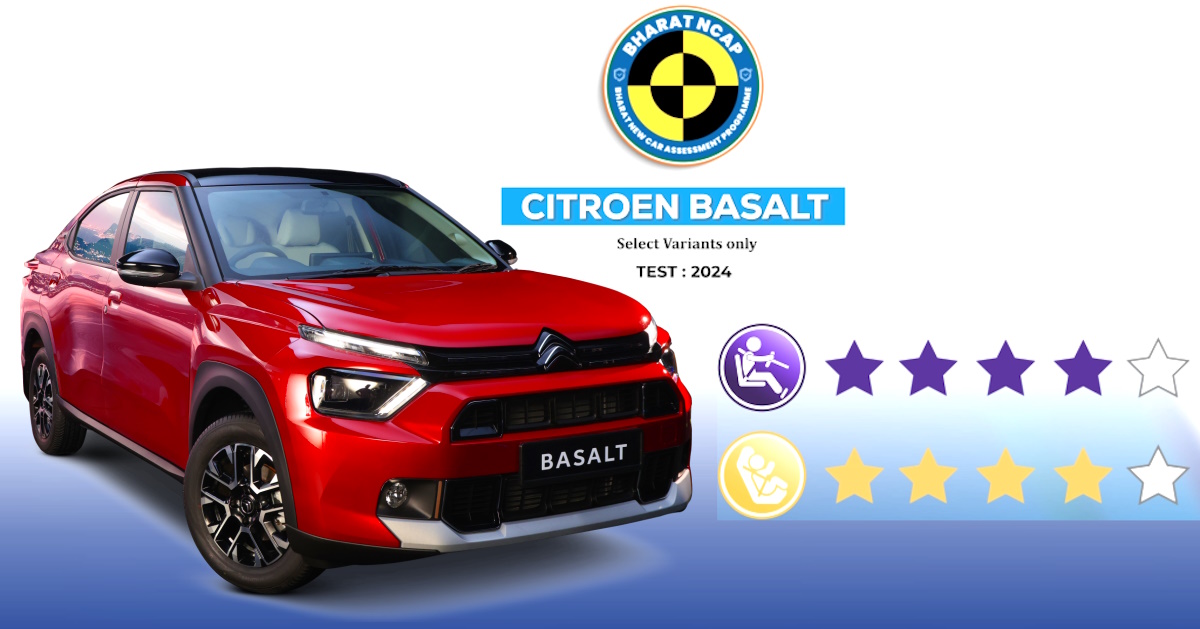Citroen Basalt SUV Coupe Scores 4 Stars In Bharat NCAP Crash Test


Citroen launched the Basalt Coupe SUV in India in August this year. The pricing was rather aggressive, starting at 7.99 lakh, ex-showroom. These are introductory and will go up in November 2024. A few months past its launch, the coupe has been crash-tested by Bharat NCAP (BNCAP)- India’s own vehicle safety evaluation program. Interestingly, the Basalt managed to store a four-star safety rating.
In the crash tests conducted by Bharat NCAP, it scored 4-star safety ratings for both adult and child occupants. It managed to score 26.19 out of 32 points for adult safety and 35.90 out of 49 for child protection. The variants tested were the You and Plus trims with the naturally aspirated petrol engine, and the Plus and Max trims powered by the turbo-petrol engine. Both manual and automatic versions were tested.
This is the fourth car being tested by BNCAP. The other three cars were the Harrier, Safari and Punch. The Basalt has thus become the first non-Tata car to be tested by Bharat NCAP.

While the BNCAP results did not include any specific remarks on the Basalt’s body shell stability, the video footage of the test shows some deformation of the body shell due to the impact. The vehicle was rated ‘good’ in the side movable impact and pole impact tests, in terms of adult safety. The front collision tests were rated from ‘Marginal’ to ‘Adequate.’ There is room for improvement here. The safety suite consists of six airbags, electronic stability control, a rear parking camera, and a tyre pressure monitoring system.

The Citroen Basalt is a fresh take on the C3 Aircross platform, offering a distinct coupe design and a comfortable cabin. It is the fourth model to be produced under the Citroen’s C-Cubed program.
Its front fascia shares similarities with the C3 Aircross SUV. The profile is sleeker and there is even a fresh rear styling. The key highlight is the sloping roofline. There are new stylish alloy wheels as well.
It is available in five mono-tone colour options: Polar White, Steel Grey, Platinum Grey, Cosmo Blue, and Garnet Red, with the white and red variants getting a contrasting black roof.
The cabin gets a similar dashboard design as the C3 Aircross. There are, however, a few updates as well. It gets a 10.2-inch touchscreen infotainment system that supports wireless Apple CarPlay and Android Auto, a digital instrument cluster, auto climate control, and rear AC vents.

It gets contoured rear headrests and segment-first adjustable thigh supports for the rear occupants. These ensure extra comfort and convenience. The boot space is a generous 470-litres.
The powertrain options consist of two 1.2 petrol units- one of which is turbocharged, while the other is a naturally aspirated unit. The NA engine produces 82hp, 115Nm, mated to a 5-speed manual transmission. The turbo-petrol produces 110hp and comes with two transmission options: a 6-speed manual gearbox and a 6AT. The manual version offers 190 Nm while the torque converter automatic offers a higher 205Nm.
Interestingly, while the Basalt performed respectably in the Bharat NCAP tests, its sibling, the Citroen C3, had scored a 0-star rating in both the Latin NCAP and Global NCAP crash tests. In both instances, the C3’s body shell was rated as unstable. Additionally, the electric version, the eC3 also scored 0 stars in its Global NCAP tests.